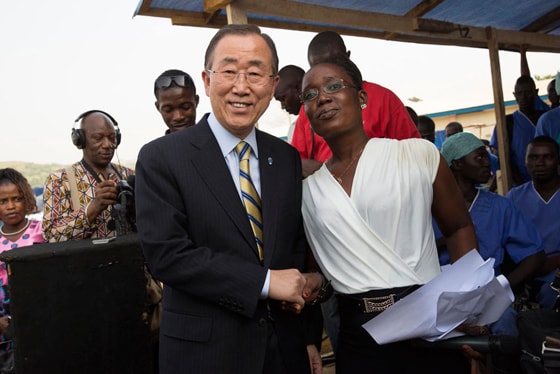Secretary-General Ban Ki Moon's visit to Guinea
(Baonghean) - On Saturday, December 20, United Nations Secretary-General Ban Ki Moon visited Guinea, one of the countries affected by the Ebola epidemic. And right before the Secretary-General's visit, an attack on the facilities of the Ebola prevention center occurred in the south of the country.
 |
| UN Secretary-General Ban Ki-moon met with doctors and nurses treating victims at the center of the Ebola outbreak in Liberia. |
Secretary-General Ban Ki-moon was welcomed by Guinean Foreign Minister Francois Louceny and Health Minister Rémy Lamah at Conakry Airport on Saturday morning. Several leaders in Guinea’s fight against Ebola were also present. The UN Secretary-General will meet with Guinean President Alpha Conde, then hold a press conference before traveling to Mali’s capital, Bamako.
This is the last day of Mr. Ban Ki Moon's visit to West African countries heavily affected by the Ebola epidemic. Secretary-General Ban Ki Moon's trip also includes Dr. Margaret Cha - Director-General of the World Health Organization (WHO) and Anthony Banbury - head of the United Nations Mission on Ebola Response (UNMEER).
Guinea is the fourth stop of the Secretary-General's West African tour, which began on Thursday. Before arriving in Guinea, Mr. Ban Ki-moon visited Ghana, Liberia and Sierra Leone. On Friday, in Liberia and Sierra Leone, the Secretary-General affirmed that the international community will continue to support and rebuild local health stations to serve the fight against Ebola in countries in the region.
It is known that just before the visit of Secretary General Ban Ki Moon, on the evening of Friday 19 December, there was a vandalism at an Ebola treatment center of Doctors Without Borders (MSF) in Southern Guinea. Hundreds of young people prevented the installation of the MSF medical center in Kissidougou City, an area heavily affected by the Ebola epidemic in Southern Guinea.
Local police said the youths first ransacked the premises, especially the MSF tents, then set fire to blankets, smashed tables and chairs and finally chased the medical staff out of the city. The attackers claimed they did not want Ebola to spread in their neighbourhood. In November, many youths also protested against the establishment of an MSF centre in Yimbaya, on the outskirts of the capital Conakry. They ransacked equipment and shouted: “We do not want Ebola in our neighbourhood! We are afraid of Ebola! No MSF! Do not pollute our environment!”
Since September, violence against Guineans protesting the fight against Ebola has escalated. Eight members of an Ebola awareness group have reportedly been killed in Guinea. However, on Friday, Guinean Prime Minister Mohamed Said Fofana inaugurated an MSF Ebola treatment center with the capacity to house up to 100 patients, located about 50 kilometers from the capital, Conakry.
Currently, Guinea, Liberia and Sierra Leone are the three countries most severely affected by the Ebola epidemic. Since the Ebola virus was first discovered in 1976 in Central Africa, this is the worst outbreak of the disease. According to the latest figures provided by the WHO on December 14, the Ebola epidemic has claimed the lives of more than 6,915 people out of 18,603 infected, of which more than 99% of the cases were detected in Guinea, Liberia and Sierra Leone.
Chu Thanh
According to LeMonde, LeFigaro December 20


